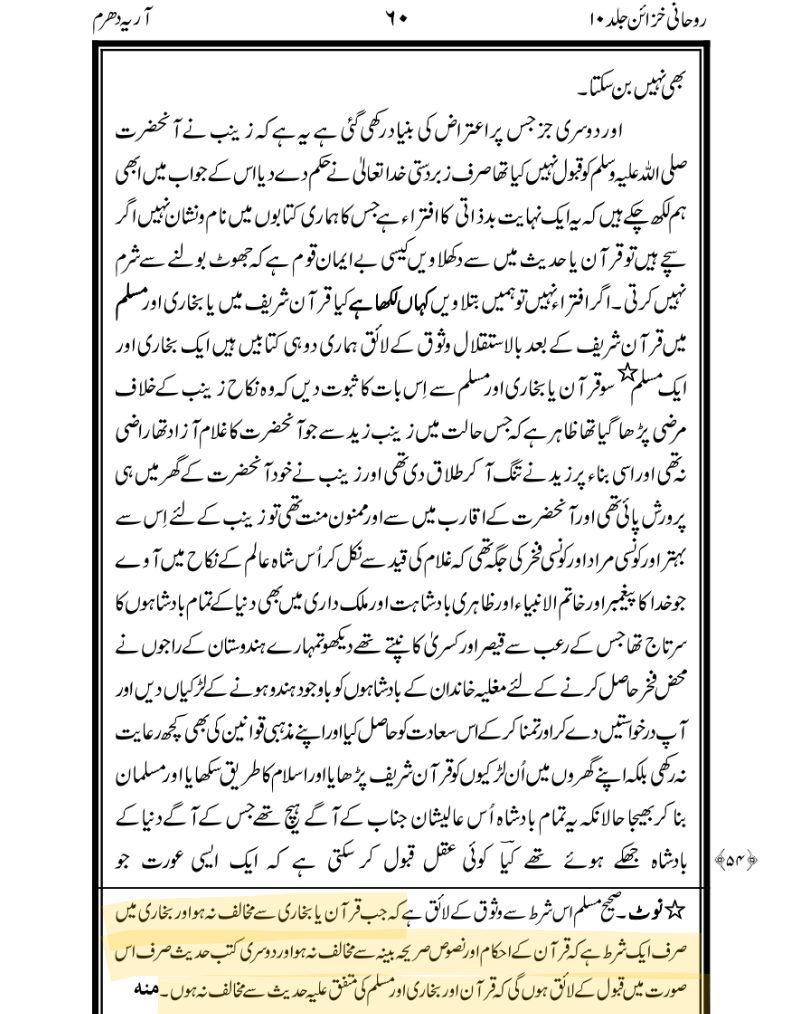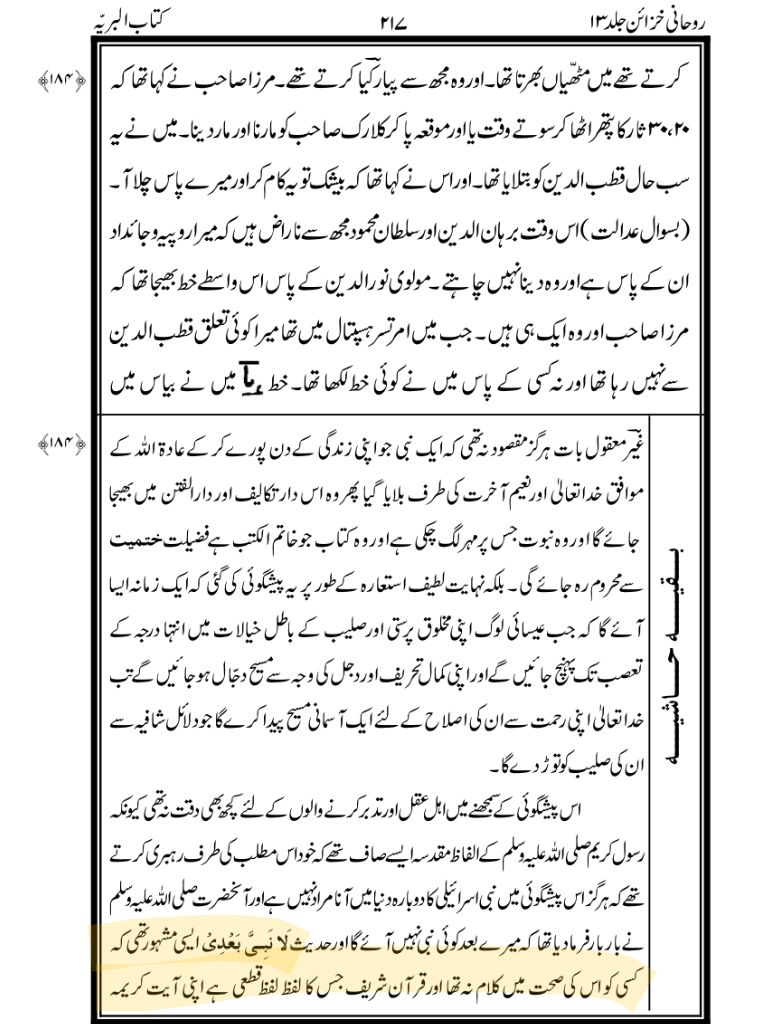False Argument of the Qadianis
The Qadianis object to the following narration from Ibn Majah and claim that prophethood is ongoing and that new prophets can come after the Prophet ﷺ until the Day of Judgment.
Let’s look at the Hadith and its translation, then we will examine the false argument of the Qadianis with a scholarly response.
Objection and Scholarly Response Regarding the Second Hadith
“قولوا خاتم النبیین ولا تقولوا لانبی بعدہ”
“Say that Muhammad ﷺ is the Seal of the Prophets, but do not say that no prophet will come after him.”
(Majma’ al-Bahar, page 85, Tafseer al-Durr al-Manthur, Volume 12, page 64, printed in Egypt)
The Qadianis use this statement to falsely argue that according to Hazrat Aisha (RA), prophethood continued after the Prophet ﷺ, since she forbade saying “no prophet will come after him.”
Scholarly and Research-Based Responses to the Qadiani Argument
Response 1:
Hazrat Aisha’s (RA) statement was in the context of the descent of Hazrat Isa (AS). A similar statement is also narrated from Hazrat Mughirah (RA).
A: Hazrat Aisha’s Statement:
“Hazrat Isa (AS) will kill the pig, break the cross, marry, and have children. Seeing all this, the people of the Book will believe in his prophethood. Hazrat Aisha’s (RA) statement ‘Say that Muhammad ﷺ is the Seal of the Prophets, but do not say that no prophet will come after him’ was in the context of the descent of Hazrat Isa (AS), which does not contradict the hadith ‘No prophet will come after me,’ because the meaning is that no prophet will come who will abrogate your Shariah.”
(Takmila Majma’ al-Bahar, page 85)
B: Hazrat Mughirah (RA)’s Statement:
“It is narrated from Shaabi (RA) that a person said in front of Hazrat Mughirah (RA), ‘May Allah’s mercy be upon Muhammad ﷺ, the Seal of the Prophets, after whom there will be no prophet.’ Hazrat Mughirah (RA) said, ‘Saying Seal of the Prophets is sufficient because we have received the hadith that Isa (AS) will return, and his coming will be both before and after Muhammad ﷺ.'”
(Tafseer al-Durr al-Manthur, Volume 12, page 64, printed in Egypt)
Response 2:
Hazrat Aisha’s (RA) statement cannot contradict the statement of the Prophet ﷺ.
“انا خاتم النبیین، لا نبی بعدی”
“I am the Seal of the Prophets, there is no prophet after me.”
Since there is a clear contradiction between the sayings of the Sahabah and the Prophet ﷺ, the authentic hadith should be given precedence. Hazrat Aisha’s (RA) statement is unverified and weak, whereas the saying “No prophet will come after me” is narrated through multiple authentic chains. Therefore, using an unverified statement as proof is against scholarly integrity.
Response 3:
There is an authentic narration directly from Hazrat Aisha (RA):
“لم یبق من النبوۃ بعدہ شیء الا المبشرات”
“After him (the Prophet ﷺ), nothing remains from prophethood except good dreams (mubashirat).”
(Kanz al-Ammal, Hadith No. 41423)
This statement from Hazrat Aisha (RA) is a clear testimony to the finality of prophethood.
Response 4:
The Qadianis quote this statement in isolation and out of context.
“ھذا ناظر الی نزول عیسیٰ علیہ السلام”
(Takmila Majma’ al-Bahar, page 85)
Hazrat Aisha’s (RA) intention was merely to exercise caution in the context of the descent of Hazrat Isa (AS) to avoid any misunderstanding. She was certainly not advocating for the advent of a new prophet.
Response 5:
Scholars have provided various explanations of Hazrat Aisha’s (RA) statement:
- First Meaning: “لا نبی مبعوث بعدہ”
(After him, no prophet will be sent.)
(Mirqat, commentary on Mishkat al-Sharif) - Second Meaning: “لا نبی خارج بعدہ”
(No prophet will appear after him.)
This meaning would contradict the descent of Hazrat Isa (AS), which is why Hazrat Mughirah (RA) exercised caution with this wording. - Third Meaning: “لا نبی حیّ بعدہ”
(No prophet will remain alive after him.)
This interpretation aligns with Hazrat Aisha’s (RA) statement in context, as she herself narrated the return of Hazrat Isa (AS).
Response 6:
The founder of the Qadiani movement, Mirza Ghulam Ahmad Qadiani, himself outlined principles regarding the acceptance or rejection of Hadith:
“Other books of hadith (besides Bukhari and Muslim) will only be accepted if they do not contradict the Qur’an and the mutually agreed upon hadiths of Bukhari and Muslim.”
(Arya Dharam, Ruhani Khazain, Volume 10, page 60)
According to Mirza Ghulam Ahmad Qadiani’s own principles, any narration that contradicts the Qur’an or the authentic hadiths of Bukhari and Muslim is not acceptable. Therefore, accepting an unverified narration to support an argument is nothing but deception.

When, according to Mirza, no book of Hadith is acceptable if it contradicts the two Sahihs (Sahih Bukhari and Sahih Muslim), then how can a report attributed to Hazrat Aisha (may Allah be pleased with her), which is unverified and contrary to the two Sahihs, be considered acceptable?
Additionally, Mirza Qadiani wrote:
“The Hadith ‘There is no Prophet after me’ was so well-known that no one had any doubts about its authenticity.”
Source:
Kitab al-Bariyyah, page 184, as found in Ruhani Khazain, Volume 13, page 217.

Question:
It is highly illogical and contrary to reason that Hazrat Aisha Siddiqah (may Allah be pleased with her), a great scholar, hadith expert, and the closest wife of the Messenger of Allah ﷺ — who was the greatest scholar and protector of the Qur’an and Hadith — would say something contrary to a Hadith that the Prophet ﷺ himself repeatedly and clearly stated:
“I am the Seal of the Prophets; there is no Prophet after me.”
(Reported in Musnad Ahmad, Tirmidhi, Abu Dawood, Sahih Muslim, etc.)
There are also authentic and connected narrations from Hazrat Aisha (may Allah be pleased with her) affirming the finality of Prophethood, such as:
“Nothing remains of Prophethood after him except the glad tidings.”
(Reported in Kanz al-A’mal, Hadith No. 41423)
Is it possible that the one whose teachings and narrations illuminated the Ummah with the knowledge of the Qur’an and Sunnah, would herself say something against such a clear, definitive, and widely reported Hadith?
This is a scholarly deception based on dishonesty by the Qadianis, who distort and manipulate sayings by disregarding their context.
If the mentioned statement attributed to Hazrat Aisha (may Allah be pleased with her) were indeed authentic, it would only have been said in the specific context of the descent of Isa (Jesus) (peace be upon him), and not as a denial of the finality of Prophethood.